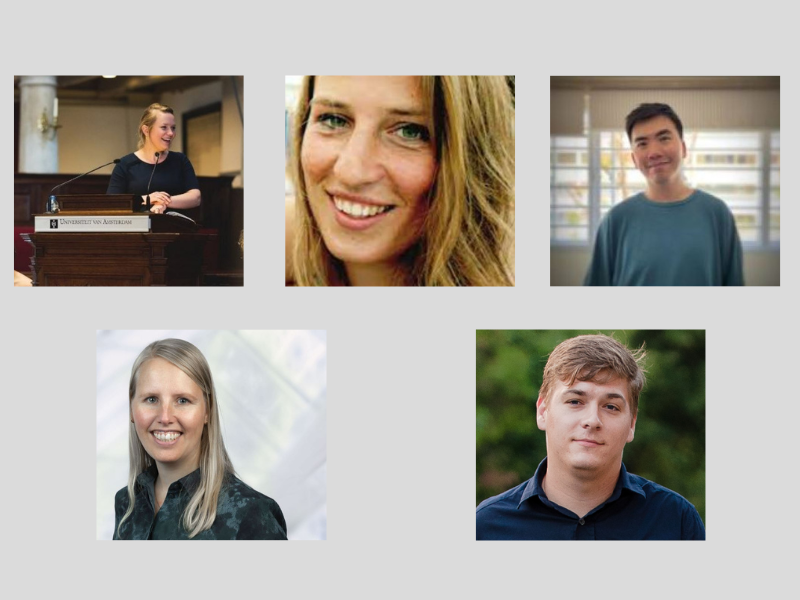Five talented researchers from the Amsterdam Institute for Infection and Immunity are set to receive Veni grants of up to 280,000 euros each from the Dutch Research Council (Nederlandse Organisatie voor Wetenschappelijk Onderzoek, NWO). These grants will provide them with the opportunity to advance their individual research concepts over a span of 3 years. The selected projects cover a wide range of areas.
A total of 188 Veni grants have been conferred by NWO upon a distinguished cohort of researchers. The Veni, a personal scientific grant, constitutes a vital component of the NWO Talent Program, catering to scholars who have recently acquired their PhDs. These grants are bestowed annually. Among the triumphant beneficiaries in this cycle from Amsterdam institute for Infection and Immunity are:

From top to bottom and from left to right: Nienke Alberts, Emma Birnie, Alvin Han, Annette Neele, and Catalin Bunduc.
Cancer RADAR: reducing cancers caused by infections among migrants in Europe
Dr. N. (Nienke) Alberts, epidemiology and data science, Infectious Diseases
Certain infections have the capacity to culminate in cancer, including those caused by the hepatitis B virus, human papillomavirus, and helicobacter pylori. Migrants could face a heightened susceptibility to such cancers. Through the Cancer RADAR initiative, a comprehensive endeavor, the objective is to chart the current and future disease impact of infection-triggered cancers among individuals with migrant origins across Europe. Additionally, the project aims to pinpoint the most effective health strategies to tackle this issue.
Antibodies for the prevention and treatment of melioidosis
Dr. E. (Emma) Birnie, experimental molecular medicine, Infectious Diseases
Melioidosis, a tropical infectious disease, stems from the soil bacterium Burkholderia pseudomallei, which is among the potential agents of bioterrorism. Each year, there are approximately 165,000 estimated cases of melioidosis worldwide, resulting in 89,000 fatalities. Regrettably, there is no available vaccine or targeted treatment for melioidosis. The researcher's goal is to devise neutralizing monoclonal antibodies to both prevent and treat this condition.
Linking human behavior and infectious diseases
Dr. A. (Alvin) Han, medical microbiology & infection prevention, Infectious Diseases
Behavioral patterns and social interactions play pivotal roles in shaping the dissemination of respiratory viruses like SARS-CoV-2, influenza viruses, and respiratory syncytial virus within communities. Yet, these critical factors frequently go overlooked in the formulation of public health strategies. This study aims to develop an innovative mathematical simulation program to gain deeper insights into the influence of human behavior and social dynamics on the transmission of respiratory viruses. The overarching objective is to leverage these insights for enhancing public health policies related to acute respiratory diseases.
Macrophage transdifferentiation in arterial calcification
Dr. A. (Annette) Neele, medical biochemistry, Inflammatory Diseases
Macrophages hold a pivotal role in arterial calcification as crucial inflammatory entities. The researcher is investigating a novel dimension of their involvement in this ailment, specifically through a process known as transdifferentiation, where they transform into smooth muscle cell-like entities. This transformation imparts distinct traits to these macrophages, contributing to the fortification of arterial calcification. This characteristic has not been formerly associated with macrophages. The study employs cell cultures to delve into the factors and mechanisms underlying this phenomenon.
Caught in the Act: Deciphering the Inner Workings of the Type VII Secretion Mechanism in Mycobacterium tuberculosis
Dr. C. (Catalin) Bunduc, systems biology, Infectious Diseases
The tuberculosis bacterium employs an almost impenetrable cell wall to shield itself from our immune system and antibiotics. However, the secretion of virulence factors necessitates the existence of channels within this cell wall. These channels are facilitated by the so-called "type VII secretion systems." Bunduc's investigation will delve into the intricate functioning of these type VII secretion systems, uncovering their remarkable ability to release proteins without compromising the integrity of the mycobacterial cell wall. By identifying these vulnerabilities in the cell wall, a foundation will be laid for the development of novel strategies in the battle against tuberculosis.
Read the full release on the NWO website (VENI 2022 | NWO).
Read more about the grants and fellowships recently awarded to our AII researchers:
Four VIDI-grants for Amsterdam institute for Infection and Immunity researchers (August 2023)
Derk Amsen receives quarter million euros from KWF (July 2023)
Mathilde Krim Fellowship for Steven de Taeye (May 2023)

